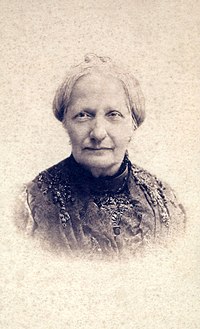Teresa Cristina of the Two Sicilies
| Teresa Cristina | |||||
|---|---|---|---|---|---|

Teresa Cristina at age 66, 1888
|
|||||
| Empress consort of Brazil | |||||
| Tenure | 30 May 1843 – 15 November 1889 | ||||
| Born |
14 March 1822 Naples, Two Sicilies |
||||
| Died | 28 December 1889 (aged 67) Porto, Portugal |
||||
| Burial | 5 December 1939 St. Peter of Alcantara Cathedral, Petrópolis, Brazil |
||||
| Spouse | Pedro II of Brazil | ||||
| Issue detail |
|||||
|
|||||
| House | Bourbon-Two Sicilies | ||||
| Father | Francis I of the Two Sicilies | ||||
| Mother | Maria Isabella of Spain | ||||
| Religion | Roman Catholic | ||||
| Signature | |||||
| Full name | |
|---|---|
| Teresa Cristina Maria Giuseppa Gaspare Baltassare Melchiore Gennara Francesca de Padova Donata Bonosa Andrea d'Avelino Rita Luitgarda Geltruda Venancia Taddea Spiridione Rocca Matilde |
|
Styles of Empress Teresa Cristina of Brazil |
|
|---|---|
 |
|
| Reference style | Her Imperial Majesty |
| Spoken style | Your Imperial Majesty |
| Alternative style | Madam |
Dona Teresa Cristina (14 March 1822 – 28 December 1889), nicknamed "the Mother of the Brazilians", was the Empress consort of Emperor Dom Pedro II of Brazil, who reigned from 1831 to 1889. Born a Princess of the Kingdom of the Two Sicilies in present-day southern Italy, she was the daughter of King Don Francesco I (Francis I) of the Italian branch of the House of Bourbon and his wife Maria Isabel (Maria Isabella). It was long believed by historians that the Princess was raised in an ultra-conservative, intolerant atmosphere which resulted in a timid and unassertive character in public and an ability to be contented with very little materially or emotionally. Recent studies revealed a more complex character, who despite having respected the social norms of the era, was able to assert a limited independence due to her strongly opinionated personality as well as her interest in learning, sciences and culture.
The Princess was married by proxy to Pedro II in 1843. Her spouse's expectations had been raised when a portrait was presented that depicted Teresa Cristina as an idealized beauty, but he was displeased by his bride's plain looks upon their first meeting later that year. Despite a cold beginning, the couple's relationship improved as time passed, due primarily to Teresa Cristina's patience, kindness, generosity and simplicity. These traits also helped her win the hearts of the Brazilian people, and her distance from political controversies shielded her from criticism. She also sponsored archaeological studies in Italy and Italian immigration to Brazil.
The marriage between Teresa Cristina and Pedro II never became passionately romantic, although a bond based upon family, mutual respect and fondness did develop. The Empress was a dutiful spouse and unfailingly supported the Emperor's positions and never interposed with her own views in public. She remained silent on the topic of his suspected extra-marital relationships—including a liaison with her daughters' governess. In turn, she was treated with unfailing respect and her position at Court and home was always secure. Of the four children Teresa Cristina bore him, two boys died in infancy and a daughter of typhoid fever at the early age of 24.
...
Wikipedia
